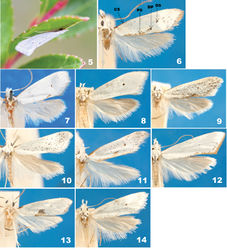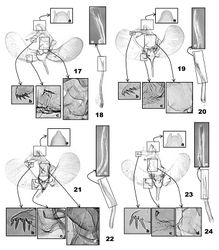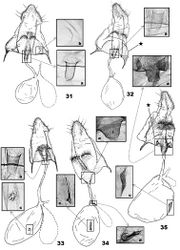Eucalantica icarusella
| Notice: | This page is derived from the original publication listed below, whose author(s) should always be credited. Further contributors may edit and improve the content of this page and, consequently, need to be credited as well (see page history). Any assessment of factual correctness requires a careful review of the original article as well as of subsequent contributions.
If you are uncertain whether your planned contribution is correct or not, we suggest that you use the associated discussion page instead of editing the page directly. This page should be cited as follows (rationale):
Citation formats to copy and paste
BibTeX: @article{Sohn2011ZooKeys118, RIS/ Endnote: TY - JOUR Wikipedia/ Citizendium: <ref name="Sohn2011ZooKeys118">{{Citation See also the citation download page at the journal. |
Ordo: Lepidoptera
Familia: Yponomeutidae
Genus: Eucalantica
Name
Eucalantica icarusella Sohn & Nishida sp. n. – Wikispecies link – ZooBank link – Pensoft Profile
Type material
Holotype ♂– COSTA RICA: San José, Cerro de la Muerte, Estación Biológica de la UCR, 9° 34' N; 83° 45' W, alt. 3050m, 20 February 1999 (K. Nishida), GSN [USNM96397], USNM. Paratypes (6♂4♀) – COSTA RICA: 1♂, San José, Cerro de la Muerte, Estación Biológica de la UCR, 9°34'N; 83°45'W, alt. 3100m, 20 December 1998, K Nishida (BMNH); 2♂, San José, Cerro de la Muerte, Estación Los Nimbolos, 9°99'42.30"N; 83°44'27.2"W, alt. 3150m, 24–27 July 2006, JB Sullivan (USNM). 2♀, Cartago, Cerro de Muerte, Pension La Georgina, 9°34'N; 83°45'W, alt. 3000m, 23–25 May 1985, J Powell, GSN [EMEC-JCS 003] (EMEC); 1♀, 7km SE El Canon, 9°40'N; 83°55'W, 28 May 1985 (J Powell), GSN [EMEC-JCS 001] (EMEC). 1♂1♀, Alajuela, Volcán Poás, 10°11'00"N; 84°12'30"W, alt. 2550m, 6–7 June 1988 (J Brown & JA Powell), GSN [EMEC-JCS 004 (♀)] (EMEC). 1♂, Heredia, Volcán Barva, 6 km ENE from Vara Blanca, 10°10'34"N; 84°06'41"W, alt. 1950–2050 m, 20 March 2002, K Nishida, abdomen missing (USNM); 1♂, ditto, 12 April 2002, K Nishida (UCR).
Diagnosis
This species is superficially similar to Eucalantica costaricae, but differs from the latter in having a posterior suffusion on the forewings and narrower hindwings. In the genitalia, Eucalantica icarusella is distinguished from Eucalantica costaricae in having projections (Fig. 23a) near the apex of the uncus in the males and having a pair of pits (Fig. 35a) near ostium bursae in the females.
Description
(Fig. 11). Forewing length 5.3–7.9 mm (mean=7.07mm, n=9); costal streak dark brown, broadly spread basally; dorsal patch at the middle of posterior margin, dentiform, orange, with a black line on upper border; posterior suffusion on basal 1/2 of dorsal margin, orange, with an intermittent black line on upper border; black spots peppering in distal 3/4, denser to distal 1/3; fringes pale gray in basal 1/3, brownish gray in distal 2/3. Hindwing anterior margin 2.5× longer than maximum width; fringes pale gray.
Male genitalia
(Figs 23, 24) (3 preparations examined). Uncus (Fig. 23a) linguiform, apex slightly protruded, lateral lobes digitate, with transverse edge apically; socii digitate, narrowly round apically, as long as saccus, long-hairy dorsally, with three terminal spines in a row, all almost same in length (Fig. 23b). Tegumen as long as uncus, subtriangular posteriorly, parallel laterally in anterior half, enlarged in posterior half; subscaphium (Fig. 23d) appressed to tegumen. Valva elongate, almost of even width throughout, rounded apically, 3.5× longer than saccus; costa slightly bulged at basal 1/5; a semicircular emargination above saccular base, adjoining with a small tubercle at upper end (Fig. 23c). Saccus digitate, robust, broadened to base, as long as socius. Aedeagus (Fig. 24) almost straight, slightly bulged medially (Fig. 24e), 2.5× longer than saccus; a zone of minute-spinulate cornuti 2/5 as long as aedeagus.
Female genitalia
(Fig. 35) (4 preparation examined). S8 sclerotized, quadrate, with a pair of semicircular, setose humps posteriorly; minute thorns on and posteriorn to S8 humps; semicircular, lateral pleats at the middle of S8 area (indicated with an asterisk in Fig. 35); a pair of pits adjacent to ostium (Fig. 35a). Apophysis posterioris 3.5× longer than apophysis anterioris excluding basal Y-fork; ventral branch of Y-fork fused with posterior margin of S8, dorsal branch 2× longer than apophysis anterioris, slightly sinuous. A zone of minute thorns extended from antrum to S8 pleats. Ductus bursae as long as corpus; antrum cylindrical, 1/6 as long as and 2× wider than ductus bursae, with minute thorns on internal wall (Fig. 35a); bulla seminalis 1/2 as long as ductus bursae. Corpus bursae oval, membranous, cervical area slightly protruding; signum keel-like with denticules on interior surface (Fig. 35c).
Distribution
Costa Rica (high elevations of Cartago, Heredia and San José).
Etymology
The new species is named after the Greek mythological character Ikaros (Icarus in Latin) and refers to the white forewing with scarlet dorsal suffusion resembling Icarus' waxy wings burnt down by sunlight.
Original Description
- Sohn, J; Nishida, K; 2011: A taxonomic review of Eucalantica Busck (Lepidoptera, Yponomeutidae) with descriptions of six new species ZooKeys, 118: 75-96. doi
Images
|


